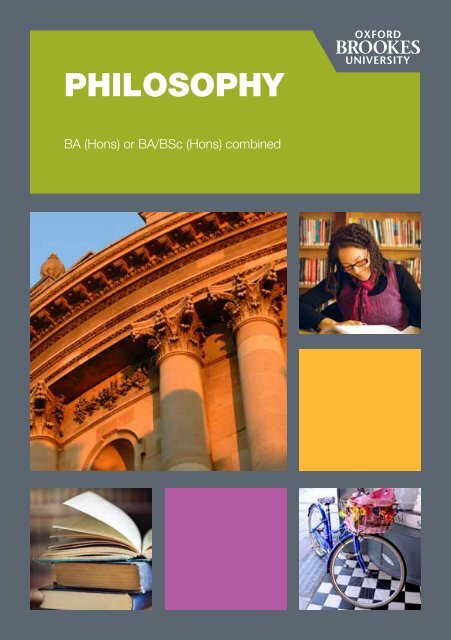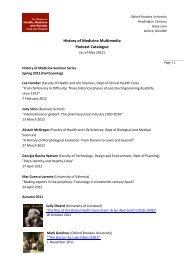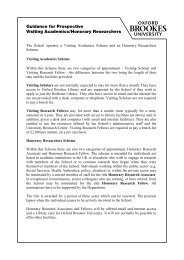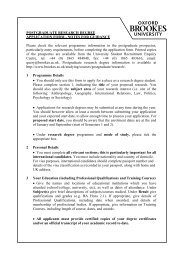PHILOSOPHY - Oxford Brookes University - Department of History
PHILOSOPHY - Oxford Brookes University - Department of History
PHILOSOPHY - Oxford Brookes University - Department of History
You also want an ePaper? Increase the reach of your titles
YUMPU automatically turns print PDFs into web optimized ePapers that Google loves.
<strong>PHILOSOPHY</strong><br />
BA (Hons) or BA/BSc (Hons) combined
Tom Stanley has just completed a BA in Philosophy at <strong>Oxford</strong> <strong>Brookes</strong>.<br />
If you’re interested in philosophy then definitely come to <strong>Brookes</strong>. <strong>Oxford</strong> is a fantastic place to go to<br />
university. The lecturers are really helpful if you ever have a problem; you just go and ask and they’ll<br />
always put aside time for you. If they can’t at that moment they’ll always give you a time and an<br />
appointment.<br />
The <strong>Brookes</strong> library services are brilliant, and you can also access the Bodleian Library which is<br />
amazing. They hold a copy <strong>of</strong> every single book published in Britain for the past 400 years, at least.<br />
For more student pr<strong>of</strong>iles visit www.history.brookes.ac.uk
WHY<br />
STUDY<br />
<strong>PHILOSOPHY</strong>?<br />
Philosophy explores the way we think and reason,<br />
questioning the assumptions that underpin what we think<br />
we know about ourselves and the world.<br />
Contents<br />
1 Why study Philosophy? 2 Why choose <strong>Oxford</strong> <strong>Brookes</strong>?<br />
4 Teaching and learning 5 Research and expertise 6 Student pr<strong>of</strong>ile<br />
7 Career choices 8 Course structure 9 Student pr<strong>of</strong>ile 10 Modules<br />
13 Key facts<br />
1
WHY<br />
CHOOSE<br />
OXFORD<br />
BROOKES?<br />
The Philosophy degree programme at <strong>Oxford</strong> <strong>Brookes</strong> enables you to tackle some<br />
<strong>of</strong> the most exciting and fundamental questions about human nature and our place<br />
in the world and to gain a comprehensive understanding <strong>of</strong> the history <strong>of</strong> philosophy<br />
and contemporary philosophical debates.<br />
Distinctive features<br />
n<br />
n<br />
n<br />
n<br />
n<br />
Choice <strong>of</strong> single or combined honours<br />
Internationally recognised course<br />
tutors<br />
First rate facilities<br />
Philosophy Society run by students<br />
Opportunity for study abroad<br />
Established reputation<br />
One <strong>of</strong> the world’s great academic cities, <strong>Oxford</strong><br />
is a key centre <strong>of</strong> debate, with conferences,<br />
seminars and forums taking place across<br />
education, science, the arts and many other<br />
subjects. <strong>Oxford</strong> <strong>Brookes</strong> students are eligible<br />
to join the <strong>Oxford</strong> Union, famous for its debates<br />
and illustrious speakers, from international<br />
politicians and leaders to sportsmen and other<br />
celebrities.<br />
Student choice<br />
As a student in <strong>Oxford</strong> you’ll be at the heart<br />
<strong>of</strong> the UK’s most successful economic region<br />
and in a centre for leading industries which will<br />
provide you with a host <strong>of</strong> work placement and<br />
other learning opportunities.<br />
Study abroad<br />
There are opportunities to study abroad for one<br />
or two semesters in Europe, the United States,<br />
Canada or Australia.<br />
2
Support<br />
Throughout your time at <strong>Brookes</strong> you will<br />
receive excellent support from our dedicated<br />
staff, both academically and personally. You<br />
will be allocated an Academic Adviser when<br />
you start who will provide academic and<br />
departmental support for you throughout your<br />
studies. In addition, our Student Support Coordinators<br />
are there to help you in all aspects <strong>of</strong><br />
your academic career, from module choices to<br />
any personal issues you may experience.<br />
We want your time at <strong>Brookes</strong> to be as<br />
enjoyable and successful as possible. That’s<br />
why we provide all the facilities you need to be<br />
relaxed, happy and healthy throughout your<br />
studies.<br />
Resources<br />
With over half a million books, DVDs and<br />
CDs, a vast range <strong>of</strong> databases, e-journals<br />
and reference materials, the library provides<br />
all the resources you need for your study <strong>of</strong><br />
Philosophy.<br />
You can also take advantage <strong>of</strong> the Library<br />
Electronic Information Network (LEIN), giving<br />
you access to a range <strong>of</strong> biographical searching<br />
tools, databases and electronic journals. Once<br />
you reach the stage <strong>of</strong> writing your dissertation<br />
you will have access to <strong>Oxford</strong>’s Bodleian<br />
Library.<br />
We have a dedicated Philosophy librarian on<br />
hand to answer your enquiries, teach you<br />
information skills and guide you around the<br />
electronic resources. The library also <strong>of</strong>fers<br />
regular training sessions on accessing and<br />
making the best use <strong>of</strong> key resources in your<br />
specific subject area.<br />
Through our Upgrade service we <strong>of</strong>fer advice<br />
on all aspects <strong>of</strong> study, from planning and<br />
writing essays to statistical analysis, either in<br />
a one to one situation or as a drop-in session.<br />
Upgrade is a free service available to all<br />
students at any level, and is unique to <strong>Oxford</strong><br />
<strong>Brookes</strong>.<br />
www.brookes.ac.uk/services/upgrade<br />
3
TEACHING<br />
AND<br />
LEARNING<br />
You can take Philosophy either as a single honours degree or in combination with<br />
another subject. Popular combinations include Religion and Theology, Psychology,<br />
English studies, Mathematics, Anthropology and Film Studies.<br />
Teaching<br />
Philosophy is taught by a team <strong>of</strong> dedicated<br />
and enthusiastic philosophers, including some<br />
<strong>of</strong> the leading researchers in their field, all are<br />
passionate about their subject and supporting<br />
students in their learning. We use a range <strong>of</strong><br />
methods to communicate with our students<br />
including:<br />
n<br />
n<br />
n<br />
n<br />
lectures<br />
group discussions<br />
seminars<br />
online discussions<br />
In your final year you can undertake your own<br />
research for your degree. Assessment takes a<br />
range <strong>of</strong> forms including written coursework,<br />
examinations and oral presentations.<br />
The course is composed <strong>of</strong> modules which<br />
will introduce you to a variety <strong>of</strong> disciplinary<br />
concepts and research interests in philosophy.<br />
4
RESEARCH<br />
AND<br />
EXPERTISE<br />
All members <strong>of</strong> the philosophy teaching team are research active and their research fully<br />
informs their teaching. This guarantees that you will have an exciting learning experience<br />
that keeps you fully informed <strong>of</strong> cutting-edge developments in the discipline.<br />
Staff research<br />
All our lecturers are published and are active<br />
in many research and consultancy projects.<br />
Particular areas <strong>of</strong> research strength include:<br />
n<br />
n<br />
n<br />
n<br />
n<br />
n<br />
philosophy <strong>of</strong> mind and action<br />
ethics<br />
history <strong>of</strong> philosophy<br />
philosophy <strong>of</strong> biology<br />
epistemology<br />
philosophy <strong>of</strong> religion<br />
The programme is designed to help you develop<br />
your own research skills that can be fully utilised in<br />
the Independent Study Module and Dissertation.<br />
Will I get involved?<br />
We value research highly and actively<br />
encourage you to become a researcher in<br />
your own right. By designing and undertaking<br />
your own research you will develop excellent<br />
analytical and and independent study skills,<br />
adding weight to your CV.<br />
75%<br />
<strong>of</strong> our philosophy<br />
research was<br />
judged to be <strong>of</strong><br />
an internationally<br />
recognised standard<br />
RAE 2008<br />
5
Siobhan Klaus studied Philosophy with the <strong>Department</strong> <strong>of</strong> <strong>History</strong>, Philosophy and Religion.<br />
I was initially attracted to the study <strong>of</strong> philosophy having read and enjoyed philosophy texts. I realised<br />
early on in my degree that the skills you gain when studying philosophy, such as being able to reason<br />
effectively and analyse arguments, are skills which are widely applicable.<br />
I chose <strong>Oxford</strong> <strong>Brookes</strong> for several reasons: I liked the philosophy department here as it is quite small<br />
and close-knit so you get to know people well, and I wanted to live in an inspiring place like <strong>Oxford</strong>.<br />
Something I’ve enjoyed during my studies has been the Philosophy Society at <strong>Brookes</strong>, which hosts<br />
guest speakers and encourages students to give talks.<br />
For more student pr<strong>of</strong>iles visit www.history.brookes.ac.uk<br />
6
CAREER<br />
CHOICES<br />
Studying philosophy will help you to develop reasoning and communication skills that<br />
are highly prized by employers.<br />
Career prospects<br />
Philosophy graduates from <strong>Oxford</strong> <strong>Brookes</strong><br />
have proven ability in communicating with<br />
clarity, research and critical analysis, working<br />
in teams and thinking independently. These<br />
interdisciplinary skills are necessary to succeed<br />
in the workplace and in postgraduate study.<br />
Philosophy graduates work in a wide range <strong>of</strong><br />
sectors including journalism and the media, the<br />
civil and diplomatic services, law, marketing,<br />
computing, management consultancy and<br />
counselling.<br />
One key feature <strong>of</strong> the <strong>Oxford</strong> <strong>Brookes</strong><br />
Philosophy programme is that it builds<br />
specialised sessions on employability into core<br />
modules at first, second and third year levels.<br />
Our Careers and Employment Centre is on<br />
hand throughout your time at <strong>Oxford</strong> <strong>Brookes</strong>,<br />
guiding your development from undergraduate<br />
to pr<strong>of</strong>essional. An invaluable resource to all<br />
students, the Centre provides a wealth <strong>of</strong><br />
information throughout your studies, from career<br />
guidance and advice, to application procedures<br />
and practical interview skills.<br />
www.brookescareerscentre.co.uk<br />
7
COURSE<br />
STRUCTURE<br />
By taking a range <strong>of</strong> specially designed modules, you will grapple with the thoughts <strong>of</strong><br />
the great thinkers from Plato to Wittgenstein and examine cutting-edge contemporary<br />
developments in the subject in areas ranging from the philosophy <strong>of</strong> mind to ethics. But<br />
above all, you will learn to think for yourself in a friendly and supportive environment.<br />
Year 1<br />
You will be introduced to the field <strong>of</strong> Philosophy<br />
through a range <strong>of</strong> foundation modules on<br />
which to devleop further study:<br />
n<br />
n<br />
n<br />
n<br />
Introduction to Philosophy<br />
Academic Literacy: Philosophy<br />
Introduction to Ethics<br />
Theory <strong>of</strong> Knowledge<br />
Years 2 and 3<br />
Independent Study in Philosophy<br />
In your second or third year you can take a<br />
single advanced module designed to develop<br />
independent learning skills and to enable you<br />
to build upon your knowledge and disciplinary<br />
skills in the philosophy field.<br />
You will carry out an individual project and<br />
must negotiate an overall programme plan<br />
and method <strong>of</strong> assessment with an appointed<br />
supervisor.<br />
The flexibility <strong>of</strong> our modular course means<br />
that you can tailor your second and third years<br />
around your interests. Modules include:<br />
n<br />
n<br />
n<br />
n<br />
n<br />
n<br />
Ancient Greek Philosophy<br />
Early Modern Philosophy<br />
Philosophy <strong>of</strong> Mind<br />
Philosophy <strong>of</strong> Religion<br />
Philosophy <strong>of</strong> Language<br />
Metaethics<br />
8
Annie Webster is in her final year <strong>of</strong> studying Philosophy as a single honours.<br />
<strong>Oxford</strong> is one <strong>of</strong> the most beautiful cities I have ever visited and there is always so much going on<br />
here academically. You have access to all the amazing museums, a chance to study in the Bodleian<br />
library and interesting scholars and doctors are passing through <strong>Oxford</strong> all the time to give talks that<br />
everyone is welcome to attend. I couldn’t think <strong>of</strong> a better place to study philosophy.<br />
I particularly like the content <strong>of</strong> the Philosophy course at <strong>Brookes</strong>. I have covered philosophy <strong>of</strong> mind,<br />
language, science, religion, action, knowledge, ethics and metaphysics from the Ancient Greeks to<br />
the Early Moderns. I am studying this one core subject, Philosophy, however I get to learn about all<br />
these other topics that surround it as well.<br />
My lecturers are excellent. I can talk to them about anything, from serious problems I am having<br />
with essays, to just chatting about philosophical problems and ideas that I have come across in my<br />
studies. The course would not have been so inspiring and fascinating without them!<br />
For more student pr<strong>of</strong>iles visit www.history.brookes.ac.uk<br />
9
MODULES<br />
10<br />
All our courses are reviewed regularly to ensure<br />
that they respond to developments in the<br />
subject area as well as the needs <strong>of</strong> employers.<br />
The list below is indicative <strong>of</strong> the range <strong>of</strong><br />
modules that we expect to be available.<br />
YEAR 1<br />
Introduction to Philosophy<br />
Provides an overview <strong>of</strong> the discipline as a<br />
whole by introducing you to problems from each<br />
<strong>of</strong> the main branches <strong>of</strong> philosophy. The module<br />
will focus on the examination <strong>of</strong> a collection <strong>of</strong><br />
issues from epistemology, philosophy <strong>of</strong> mind,<br />
metaphysics and ethics. The course stands<br />
alone but can be considered as the primary<br />
foundation from which to begin a deeper study<br />
<strong>of</strong> philosophy.<br />
Academic Literacy<br />
Provides you with the basic tools that you<br />
need in order to study philosophy effectively<br />
in a university context. These tools include<br />
the understanding <strong>of</strong> a series <strong>of</strong> basic<br />
philosophical concepts that are presupposed<br />
in much philosophical debate. The tools also<br />
include the ability to read philosophy, identify<br />
a philosophical question, and construct and<br />
evaluate a philosophical argument.<br />
Introduction to Ethics<br />
The purpose <strong>of</strong> this module is to get you<br />
thinking in a systematic and structured fashion<br />
about ethical matters. The primary focus will be<br />
normative ethics, as distinct from both applied<br />
ethics and metaethics. Three different normative<br />
theories will be considered and critically<br />
assessed.<br />
Theory <strong>of</strong> Knowledge<br />
Examines fundamental questions about<br />
knowledge: what exactly is knowledge?; is<br />
perception the only source <strong>of</strong> knowledge?; is<br />
it possible to gain knowledge <strong>of</strong> what another<br />
person is thinking or how they are feeling?<br />
YEARS 2 AND 3<br />
Ancient Greek Philosophy<br />
This double module is designed to introduce<br />
you to the two greatest philosophers <strong>of</strong> ancient<br />
Greece, Plato and Aristotle. The focus is on<br />
ethical and political themes in Plato's Republic<br />
and Aristotle's Nicomachean Ethics. Apart from<br />
their intrinsic interest, these texts are among the<br />
most influential in the history <strong>of</strong> philosophy.<br />
Early Modern Philosophy<br />
A double module that introduces you to<br />
representative texts from the early modern<br />
period. The module is divided roughly into two
parts, the first being devoted to Descartes'<br />
Meditations on First Philosophy, the second<br />
to Hume's Enquiries concerning Human<br />
Understanding.<br />
The Philosophy <strong>of</strong> Religion<br />
The module engages with the central issues<br />
that religion raises for philosophy. While the<br />
focus will be on the Western tradition <strong>of</strong><br />
thought, the module will address the question<br />
<strong>of</strong> defining religion and situate western themes<br />
in the philosophy <strong>of</strong> religion in relation to world<br />
religions. Issues such as the existence <strong>of</strong> God,<br />
the rationality <strong>of</strong> belief, the problem <strong>of</strong> evil, and<br />
the special character <strong>of</strong> religious language will<br />
be examined.<br />
Culture, Gender and Sexuality<br />
Explores the relationship between issues <strong>of</strong><br />
gender, sexuality and culture as key factors in<br />
human identity, development and society. It<br />
critiques traditional and static understandings<br />
<strong>of</strong> gender and sexuality, drawing on the insights<br />
<strong>of</strong> a diversity <strong>of</strong> disciplines including gender<br />
studies, critical theory, queer theory, feminist<br />
philosophy and feminist criticism.<br />
Philosophy <strong>of</strong> Science<br />
Introduces you to some <strong>of</strong> the leading figures<br />
and issues in the philosophy <strong>of</strong> science. The<br />
work <strong>of</strong> Popper, Kuhn and Feyerabend will be<br />
discussed. A background theme throughout the<br />
module is the realist dispute in science, i.e., the<br />
question concerning whether mature scientific<br />
theories ought to be seen as providing a literally<br />
true representation <strong>of</strong> (some aspect <strong>of</strong>) the<br />
world, or whether they should be taken in an<br />
anti-realist sense, say as mere instruments <strong>of</strong><br />
prediction and control <strong>of</strong> phenomena.<br />
Philosophy <strong>of</strong> Language<br />
An introduction to one <strong>of</strong> the dominant<br />
contemporary traditions in philosophy. The<br />
Anglo-American analytic tradition places great<br />
emphasis upon understanding how language<br />
works. The aim <strong>of</strong> this module is to provide<br />
you with a grounding in the basic approaches<br />
to meaning and reference. The import <strong>of</strong> these<br />
theories for other areas <strong>of</strong> philosophy will also<br />
be explored.<br />
Hellenistic Philosophy<br />
In ancient Greece philosophy was thought to<br />
be more than simply a discipline <strong>of</strong> academic<br />
interest. Many philosophers saw themselves as<br />
analogous to physicians. If physicians treat and<br />
heal the body, the work <strong>of</strong> the philosopher was<br />
to provide comparable therapy for the soul. This<br />
view was common to Aristotle, the Epicureans,<br />
the Sceptics and the Stoics. This module is<br />
designed to introduce you to this philosophical<br />
tradition and the work <strong>of</strong> its proponents.<br />
Metaethics<br />
The module is devoted to the sustained and<br />
detailed exploration <strong>of</strong> a topic introduced in the<br />
compulsory Introduction to Philosophy, namely,<br />
the realism vs. non-cognitivism dispute in metaethics.<br />
The implications <strong>of</strong> meta-ethical theories<br />
for normative ethics will also be explored.<br />
This module relates to elements <strong>of</strong> virtually all<br />
<strong>of</strong> the earlier modules, and can be seen as<br />
the culmination <strong>of</strong> the undergraduate degree<br />
course.<br />
Philosophy <strong>of</strong> Mind<br />
Introduces students to one <strong>of</strong> the liveliest areas<br />
<strong>of</strong> current research, contemporary philosophy<br />
<strong>of</strong> mind. Much current work in the field is<br />
devoted to the task <strong>of</strong> explaining how mental<br />
phenomena can be accommodated within a<br />
physicalist framework. The leading assumption<br />
<strong>of</strong> this module is a commitment to ‘minimal<br />
physicalism’ - the view that mental phenomena<br />
supervene upon the physical.<br />
Special Topics in Philosophy<br />
Designed to hone the reading and oral<br />
presentation skills <strong>of</strong> honours students. This is<br />
predominantly a student-led module. Students<br />
present seminar papers on classic philosophical<br />
works - either journal articles or chapters from<br />
seminal monographs – and students assess<br />
each other’s presentations. There is no fixed set<br />
<strong>of</strong> topics, articles or monographs. Topics and<br />
works change to match the current state <strong>of</strong> the<br />
discipline<br />
Medieval Philosophy<br />
Introduces you to an unfairly neglected period<br />
in the history <strong>of</strong> western philosophy and to<br />
the extremely high quality work produced in<br />
this period by a variety <strong>of</strong> thinkers, work that<br />
continues to attract current interest. It is also<br />
11
12<br />
designed to provide you with the means <strong>of</strong> filling<br />
in the historical gap between ancient Greek<br />
philosophy and the modern period.<br />
Foundations <strong>of</strong> German Idealism<br />
The module will introduce you to perhaps the<br />
most influential work in the history <strong>of</strong> modern<br />
philosophy, Kant’s Critique <strong>of</strong> Pure Reason.<br />
You will explore Kant’s striking new claims in<br />
both epistemology and metaphysics, claims<br />
whose implications extend into such diverse<br />
areas as the philosophy <strong>of</strong> science, ethics,<br />
cosmology and theology. This module focuses<br />
on the reasoning behind Kant’s ‘Copernican<br />
Revolution’.<br />
Wittgesntein’s Later Philosophy<br />
Examines the later work <strong>of</strong> Ludwig Wittgenstein,<br />
one <strong>of</strong> the most influential and controversial<br />
philosophers <strong>of</strong> the twentieth century. Particular<br />
emphasis is placed upon his views on the<br />
nature <strong>of</strong> philosophy and <strong>of</strong> language and mind<br />
and how these undermine widely help positions<br />
in contemporary philosophy.<br />
Independent Study in Philosophy<br />
Designed to develop independent learning<br />
skills and to enable you to build upon your<br />
knowledge and disciplinary skills. You will carry<br />
out individual projects and must negotiate<br />
an overall programme plan and method <strong>of</strong><br />
assessment with an appointed supervisor.<br />
Philosophy Interdisciplinary Dissertation<br />
A critical investigation and written presentation<br />
<strong>of</strong> a topic, theme or issue, selected by the<br />
student and relevant to the field <strong>of</strong> Philosophy.<br />
Philosophy Dissertation (Double Module)<br />
An extended critical investigation and written<br />
presentation <strong>of</strong> a topic, theme or issue,<br />
selected by the student and relevant to the field<br />
<strong>of</strong> Philosophy.<br />
Continental Philosophy <strong>of</strong> Religion<br />
This module introduces you to some <strong>of</strong> the key<br />
thinkers in Continental Philosophy through a<br />
discussion <strong>of</strong> the concept <strong>of</strong> God. Beginning<br />
with ‘the masters <strong>of</strong> suspicion’ (Nietzsche,<br />
Marx and Freud), the course will proceed to<br />
consider different responses to the critique <strong>of</strong><br />
God and religion. Attention will be paid to those<br />
like Sartre who suggest the death <strong>of</strong> God is<br />
necessary for human freedom, and to those like<br />
Kierkegaard, Irigaray and Kristeva who suggest<br />
different ways <strong>of</strong> approaching the divine for<br />
modern religious thinking.<br />
Freedom, Justice and the Community<br />
This module examines the key political<br />
concepts <strong>of</strong> freedom, justice and the<br />
community taking account <strong>of</strong> the affiliated<br />
concepts <strong>of</strong> rights and equality. In considering<br />
these concepts differing theoretical treatments<br />
<strong>of</strong> them will be related to the roles they play<br />
in the practical world <strong>of</strong> politics. Liberal,<br />
radical, feminist and communitarian theoretical<br />
standpoints are analysed.
KEY<br />
FACTS<br />
DURATION<br />
Full time:<br />
3 years<br />
Part time:<br />
Up to 6 years<br />
HOW TO APPLY<br />
Application is<br />
through UCAS. See<br />
our website for course<br />
codes.<br />
TYPICAL OFFERS<br />
A level: BBC or<br />
equivalent<br />
IB Diploma: 30 points<br />
Advanced Diploma:<br />
grade C, including<br />
A-level at grade B<br />
For combined<br />
honours, normally the<br />
<strong>of</strong>fer will lie between<br />
the <strong>of</strong>fer quoted for<br />
each subject.<br />
TEACHING<br />
LOCATION<br />
Harcourt Hill Campus<br />
ACADEMIC<br />
FACULTY<br />
Faculty <strong>of</strong> Humanities<br />
and Social Sciences<br />
Contact<br />
tel +44 (0) 1865 484848 email query@brookes.ac.uk www.history.brookes.ac.uk<br />
13
<strong>Oxford</strong> <strong>Brookes</strong> <strong>University</strong><br />
Harcourt Hill Campus<br />
<strong>Oxford</strong><br />
OX2 9AT<br />
Tel: +44 (0)1865 484848<br />
query@brookes.ac.uk<br />
Follow us on<br />
Facebook<br />
Twitter<br />
YouTube<br />
www.facebook.com/brookes.history<br />
www.twitter.com/hss_brookes<br />
www.youtube.com/oxfordbrookes<br />
<strong>Oxford</strong> <strong>Brookes</strong> promotes equality <strong>of</strong> opportunity for all who study, work and visit here.<br />
For more details please visit www.brookes.ac.uk/services/hr/eod or phone +44 (0)1865 485929.<br />
To obtain a large-print copy <strong>of</strong> this publication or to enquire about<br />
other formats please contact +44 (0) 1865 484848 or email<br />
query@brookes.ac.uk<br />
3837














